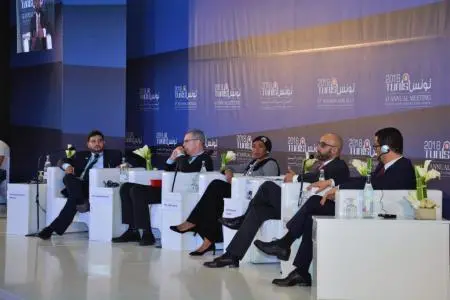PHOTO
Tunis: – The Islamic Development Bank (IDB), in partnership with the Central Bank of Tunisia and Banque Zitouna, have held a seminar that discussed ways in which Islamic capital markets can contribute to achieving the Sustainable Development Goals (SDGs).
The seminar was held on 3 April 2018 in Tunis, Tunisia, on the sidelines of the 43rd Annaul Meeting of the IDB Group.
In an address of welcome, IDB Vice President (Finance and CFO), Dr. Zamir Iqbal, highlighted the need for involving the private sector and capital markets in the financing of development projects.
Governor of the Central Bank of Tunisia, Dr. Marouane El Abbasi, spoke on the recent developments within Tunisia with respect to capital market development and the growing significance of Islamic finance as an alternative means of financial intermediation.
In separate keynote speeches, Dr. Mahmoud Mohieldin, Senior Vice President at the Word Bank, and the Indonesian Finance Minister Dr. Sri Mulyani Indrawati, highlighted the magnitude of the challenge of achieving SDGs and the role Islamic finance can play in supporting financial stability, financial inclusion, social impact and infrastructure development.
A panel comprising four experts in Islamic capital markets subsequently discussed the challenges and prospects of Islamic capital markets in IDB member countries. The panelists included Mr. Michael Bennett, Head of Derivatives and Structured Finance at the World Bank, who shared examples of the numerous successful initiatives that have brought together ethical, value-based and Shari’ah compliant investments.
Mrs. Hajara Adeola, Managing Director and CEO of Lotus Capital, Nigeria, highlighted Nigeria’s Islamic finance and Sukuk issuance experience and stressed the need for the creation of a proper ecosystem to promote Islamic finance.
Mr. Mohammed Dawood, Managing Director and Global Head of Sukuk Financing at HSBC, emphasized the need to manage risks related to Sukuk issuances by ensuring that legal, Shari’ah and commercial considerations are thoroughly vetted. He highlighted the need for more standardization to provide greater comfort to investors and enable wider issuance of Sukuk.
Mr. Mounir Fakhet, Chief Risk Officer of Banque Zitouna, shared Tunisia’s experience with Islamic finance and the significant potential it has for capital markets, infrastructure development, SME finance and microfinance initiatives that can have a huge impact on financial inclusion and job creation.
-Ends-
© Press Release 2018



















